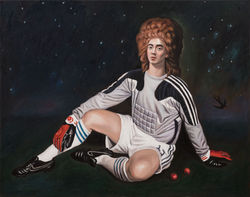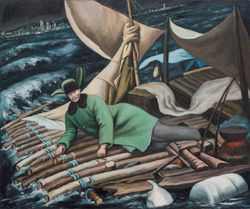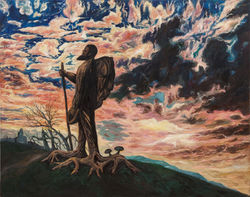Tang Contemporary Art is thrilled to present “Fragrance of the Night”, an exhibition by Chinese contemporary artist Qin Qi, marking the artist’s debut solo presentation in Hong Kong and his second solo show with the gallery. Curated by Cui Cancan, the exhibition will focus on the artist’s fascination with colonial history and exotic lands.
“Fragrance of the Night” was released in the 1940s. It was thought to be an “anesthetic” song for the people in the enemy-occupied territory and regarded as decadent music. The song became widely popular, with nearly a hundred covers performed by many singers. Another meaning of the exhibition title is “tuberose” which is a type of plant that grows in Southeastern China, tropical Asia and South America. It is a night blooming flower that is known for its intense fragrance and exotic culture.
Starting from 2017, themed paintings illustrating exotic cultures and colonial flavours have become a distinctive feature of Qin Qi’s work, marking a new context in his artistic creation. Before that, Qin Qi had gone through a five year-long exploration and improvement of artistic language and concepts, breaking away from the steady style and liberating his self-interest. He uses various art styles and vocabulary to inspire new possibilities. “Possibility” is only a phase, while he must always maintain a substantial transformation in the works’ surroundings and subject matters. Large and small paintings’ difference in time and space, as well as the freshness, roughness and broad ambitions of brushstrokes anticipate the arrival of “unforeseen”.
Romanticism becomes the unique tone of this exhibition: extensive historical backdrop and nature of sudden changes cast light on traces of human conquest. Strange and mysterious distant world with old stories from the New World or colonial period is visually reinterpreted in Qin Qi’s works. Qin Qi reconstructed the relationship between oneself, art styles and representations. This relationship allows us to experience the feeling of déjà vu, subjective emotions of romanticism, historical ambience of classicism and visual taste of ornamentalism. Qin Qi freely travels back and forth between these styles, which can be seen in “Whale Hunters”: human figures in small boats are bobbing up and down in the sea and incessantly wielding with their muscular arms. They need to ride the wooden boats in big waves and also accurately harpoon the prey. Though gaining an understanding of the historical resources or subjective feelings does not interpret the core of artist’s work, it is rather expressed through collecting and borrowing the stories illustrated in paintings. No matter what the story is about, Qin Qi would intentionally create a sense of strangeness and distance using unusual shapes, both awkward and humorous. By doing so, he stops following the classical way of storytelling and traditional aesthetics. Some unrelated objects appear underneath the rough brushstrokes, breaking the integrity of past and gaining a new symbolic association in Qin Qi’s works.
There is Ma Yun, the head of the Alibaba group, wearing an Arabic costume and sitting in the desert next to a Persian camel. “Setting Sun” shows a wandering monk looking into the distance, his legs turned into tree roots sowing seeds: here, the distance and rooting become mutually exclusive, and two mushrooms in the background bring a humorous effect into the work. In Qin Qi’s practice, styles form a tandem connection, stories contain more stories, and languages recreate more languages. Nevertheless, by bringing these diverse elements together, we can discover the unique trajectory of the artist in the past two years. This free use of styles, reconstruction of stories, mix of languages form a path to self-existence. The process has its own purpose and every journey has its own independent meaning.
Qin Qi’s paintings have strong exotic flavours and colonial themes that will be soon exhibited in the city with a dual colonial history. In the history of art, it inadvertently touched upon the most important hidden clues of early modernism, borrowing ideas from African and maritime culture, and the waves of colonialism played a major role in the formation of early modernist style. In reality, Qin Qi’s works, song “Fragrance of the Night”, Hong Kong’s history and this moment merge into a single entity. This city used to be a “foreign land” having a profound role and significance. The situation today resembles the exhibition title: widely popular and decadent, yet so confusing at night that the result is hard to predict.
 Fake Foreigner 130 x 165 cm oil on canvas 2019 |  Hunter 80 x 100 cm oil on canvas 2018 |  Story of Zhang Yue 190 x 250 cm oil on canvas 2018 - 2019 |
|---|---|---|
 Wooden Raft 100 x 120 cm oil on canvas 2019 |  Two Servants 170 x 220 cm oil on canvas 2019 |  Fragrance of the Night 300 x 800 cm oil on canvas 2018 |
 Setting Sun 160 x 200 cm oil on canvas 2018 |  Dragon's Heart and Tiger's Strength 80 x 120 cm oil on canvas 2019 |  Whale Hunters 300 x 400 cm oil on canvas 2018 |
 Long Journey 100 x 220 cm oil on canvas 2019 |  Pumpkin Steamed Lobsters 120 x 120 cm oil on canvas 2019 |  Alibaba 3 170 x 220 cm oil on canvas 2019 |

Qin Qi
b. 1975 Shaanxi, China
Qin Qi graduated from the Department of Oil Painting at the Lu Xun Academy in Shenyang. Since Qin Qi emerged in the art world in 2002, he has created work that both negates and advances ideas and styles, forging a distinctive path for himself within a new generation of painting. He began with erotic images and allegorical narratives in early 2000, then in 2004, he shifted toward pictorial experiments in painting. Later, he moved away from the event-driven and unfinished qualities of these images and engaged with a consciousness of form and structure, and developed weight, brushstrokes, and vision in his images.
His works are characterized by a surreal dimension, through which he strives to depict things taken from a familiar context and represented with a reconfiguration of their concepts. His compositions are characterized by still life, real landscapes, dream-like situations and sketches from nature, all different elements that he has rationally chosen to assemble together in order to prove the coexistence of many different worlds. Qin Qi is a visual thinker and his compositions, no matter often permeated by a sense of ambiguity; appear as subtle representations of a consciousness that goes beyond forms to reach their more remote meanings.
Qin Qi has participated to exhibitions worldwide; in 2008 he was part of Guangzhou Triennale and Nanjing Triennale; in 2009 his works have been presented at Prague Biennale. In 2011 Qin Qi had his first solo show at Minsheng Museum in Shanghai.

Curator: Cui Cancan
Cui Cancan is an independent curator in China, he has won Chinese Contemporary Art Award Critic Award, Yi Shu Award for Critical Writing etc., curated main exhibitions like Hei Qiao Night Way (2013), Xiang Cun Xi jian Chui (2013), FUCKOFF II (2013), Unlived by What is Seen (2014), Between the 5th and 6th Ring Road in Beijing (2015), The Decameron (2016), Curated solo exhibitions like Ai Weiwei, Xia Xiaowan, Shen Shaomin, Wang Qingsong, He Yunchang, Xiao Yu, Qin Ga, Xie Nanxing, Shi Jinsong, Li Zhanyang, Xu Zhongmin, Ma Ke, Xia xing, Zhao Zhao, Li Qing, Chen Yufan, Chen Yujun, Li Binyuan, Feng Lin, Zhang Yue, Zong Ning, Jiang Bo etc.
Inquire about this exhibition



